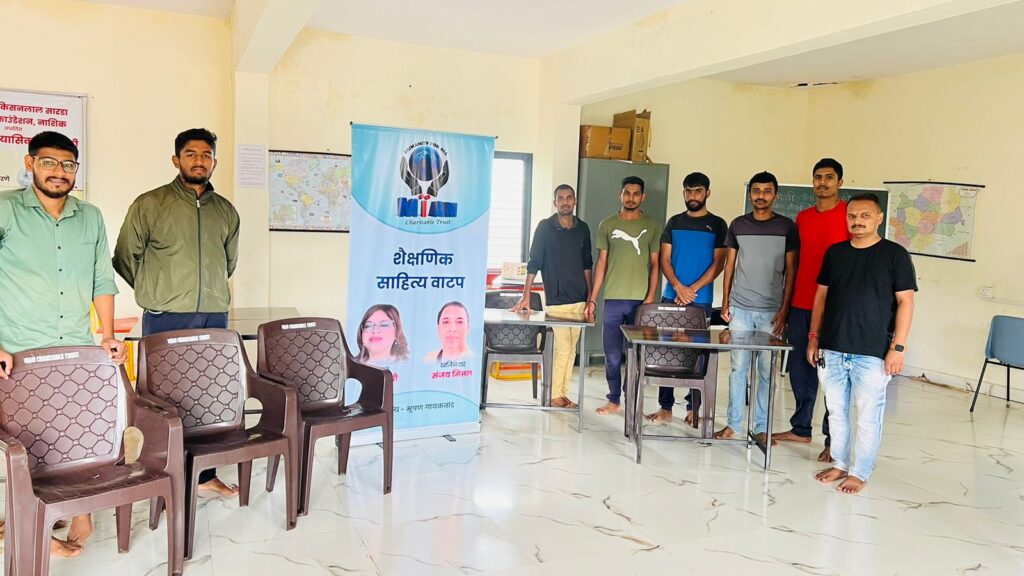- nitu@miamcharitabletrust.com
- Mumbai, India
- nitu@miamcharitabletrust.com
- Mumbai, India

MIAM Charitable Trust Establishes Three New Libraries in Nasik District Villages – Ganeshgao, Donwade, and Lahvit
Introduction
In a heartwarming initiative aimed at improving educational infrastructure and opportunities, Nitu Joshi, the head of MIAM Charitable Trust, recently spearheaded a donation of furniture in the Nashik district. This endeavor seeks to support students in their academic pursuits by enhancing the learning environment in village schools.
Background of Nashik District
Nashik, located in the Indian state of Maharashtra, holds historical significance and is known for its rich cultural heritage. While the district boasts of numerous attractions, including ancient temples and picturesque landscapes, it also faces socio-economic challenges, particularly in the realm of education. Despite efforts to improve the educational landscape, many schools in rural areas lack basic amenities, hindering students’ learning experience.
Initiative by Nitu Joshi
Driven by a deep-seated commitment to social welfare and education, Nitu Joshi envisioned an initiative to address the pressing need for adequate infrastructure in village schools. With the support of MIAM Charitable Trust, she embarked on a mission to provide essential furniture to schools in Nashik district, thereby facilitating a conducive learning environment for students.
Description of the Donation
The donation encompassed a variety of furniture items, including desks, chairs, and shelves. These essential pieces of furniture are instrumental in creating a comfortable and organized setting within classrooms, enabling students to focus better on their studies. The quantity of furniture provided was substantial, ensuring that each school received an adequate supply to cater to the needs of its students.
Impact on Students
The donation of furniture has had a profound impact on the students of Nashik district. By addressing the shortage of furniture in schools, the initiative has significantly enhanced the learning environment. Students now have access to proper seating arrangements, which promotes better posture and concentration during classes. Moreover, the availability of shelves facilitates the organization of educational materials, fostering a more structured approach to learning.
Community Involvement
The success of this initiative would not have been possible without the active involvement of the local community. Volunteers came forward to assist in various aspects of the donation process, from logistics to distribution. Additionally, stakeholders such as teachers and parents played a crucial role in identifying schools in need and ensuring that the donated furniture reached its intended recipients.

Challenges Faced
Despite the noble intentions behind the donation, the initiative encountered several challenges along the way. Logistics posed a significant hurdle, particularly in reaching remote villages with limited transportation infrastructure. However, through meticulous planning and coordination, these challenges were effectively addressed, allowing the donation process to proceed smoothly.
Feedback and Response
The response to the donation initiative has been overwhelmingly positive, with students and teachers expressing gratitude for the much-needed support. The newfound comfort and convenience afforded by the donated furniture have been met with appreciation, underscoring the tangible impact of the initiative on the daily lives of students.
Future Plans
Looking ahead, Nitu Joshi remains steadfast in her commitment to empowering communities through education. Building on the success of the furniture donation project, she envisions a series of future initiatives aimed at further enhancing educational opportunities for underserved populations. By fostering collaboration and sustainable development, MIAM Charitable Trust strives to create a brighter future for the youth of Nashik district.
Conclusion
In conclusion, the donation of furniture in Nashik district represents a commendable effort to address the infrastructure gap in rural education. Through the generosity and dedication of individuals like Nitu Joshi and organizations like MIAM Charitable Trust, tangible improvements have been made to the learning environment, thereby opening doors to brighter futures for students.
FAQs
- How was the need for furniture identified in Nashik district?
- The need for furniture was identified through collaboration with local stakeholders, including teachers and community members, who highlighted the challenges faced by schools in rural areas.
- Is MIAM Charitable Trust involved in other philanthropic activities?
- Yes, MIAM Charitable Trust is actively involved in various social welfare initiatives, ranging from education to healthcare and community development.
- How can individuals contribute to similar initiatives in their communities?
- Individuals can contribute by volunteering their time, resources, or expertise to organizations working towards improving educational infrastructure in underserved areas.
- What measures are in place to ensure the sustainability of the donation initiative?
- MIAM Charitable Trust is committed to monitoring the impact of its initiatives and implementing measures to ensure long-term sustainability, such as maintenance programs and community involvement.
- Are there plans to expand the donation initiative to other regions?
- While the focus is currently on Nashik district, MIAM Charitable Trust remains open to expanding its outreach to other regions facing similar challenges in the future.
